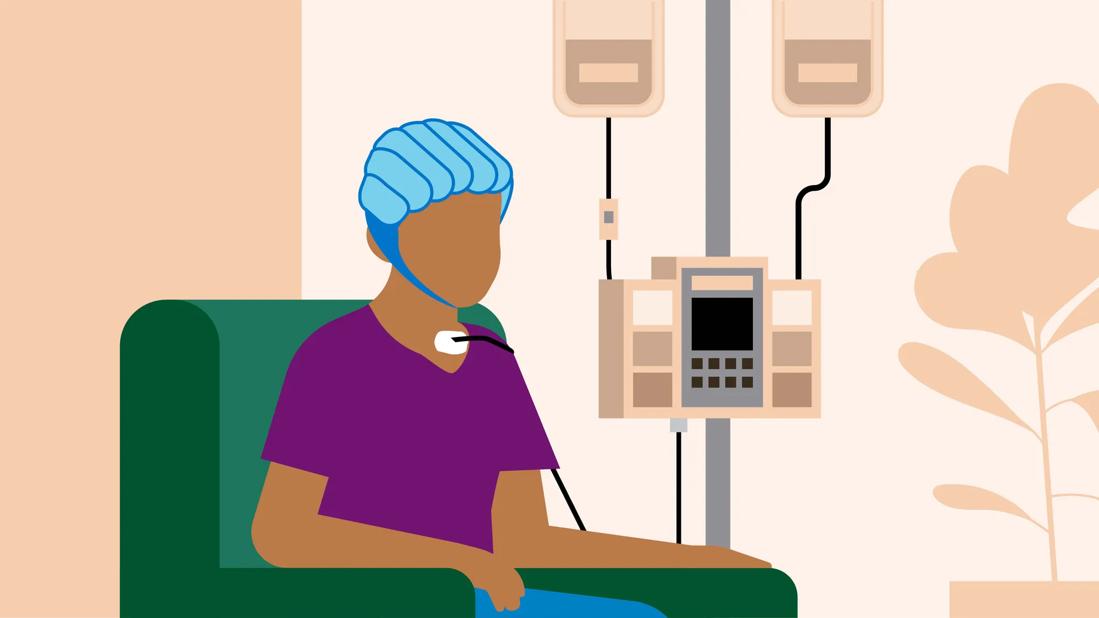Chemo cold caps may help you keep more of your hair during therapy

Image content: This image is available to view online.
View image online (https://assets.clevelandclinic.org/transform/b4b4d9bb-26e6-45b6-9ec2-68ef53d669e4/chemotherapy-patient-cold-cap-1514689362)
Person receiving chemotherapy, wearing a cold cap
Hair loss can be a big concern for people going through chemotherapy. And while hair typically grows back after treatment, hair loss can be distressing — like an outward reminder of just one more way cancer has changed you.
Advertisement
Cleveland Clinic is a non-profit academic medical center. Advertising on our site helps support our mission. We do not endorse non-Cleveland Clinic products or services. Policy
“It becomes about more than hair. It can feel vulnerable, like a loss of normalcy and a blow to your self-confidence,” recognizes oncologist Megan Kruse, MD.
So, when you hear about cold capping for chemo and the promise of (maybe) retaining your locks, it’s natural to want to learn more. Dr. Kruse shares how it works.
Cold capping, also called scalp cooling, is a treatment that uses cold to constrict the blood vessels in your scalp. It can help you retain more hair while undergoing chemotherapy treatment. The cold helps keep the cell-killing chemo away from the hair follicles (where hair is produced) to protect your hair.
“The idea is that when you expose the scalp to cold, the blood vessels in your scalp clamp down,” Dr. Kruse explains. “That means less chemotherapy is delivered through the blood vessels to the hair follicles.”
Before you get your hopes too high, know that cold capping isn’t a guarantee that you won’t lose some of your hair.
“Some people go in thinking they’re going to keep all of their hair and that it won’t look any different,” she adds. “But that’s usually not true. Typically, you’ll still have some hair loss, and it can be more pronounced at the top of your head. But it should grow back after you’ve completed chemo treatment.”
Advertisement
There are two kinds of cold caps:
The type you use is a personal decision and may be influenced by things like cost and convenience. Some medical facilities may even provide cold caps.
Keep in mind that frozen gel caps need to be rotated regularly during treatment, so it can help to have someone with you to help change them.
If you choose to use a scalp cooling system, expect to wear it during each chemotherapy treatment, as well as 30 to 60 minutes before and after each session.
Using it consistently, starting with your first treatment, is key, Dr. Kruse notes: “The effects of chemo, in terms of hair loss, will set in after that first treatment.”
Cold capping isn't right for everyone. And whether it will work for you depends on factors like the type of cancer you have, your medical history, and the chemotherapy medications and dosages you receive.
“Some chemotherapy medications are so potent that if even a little bit gets up to the hair follicles, they’ll probably die off, even if you’re using a cold cap,” Dr. Kruse clarifies.
Your cancer care team may advise against cold capping if you:
While wearing the cold cap, your head will be ... well, cold. And that could feel uncomfortable. The circulating cooling fluid that cools the scalp is set to just about freezing — 36 degrees Fahrenheit (2 degrees Celsius). The goal is for your scalp temperature to be between 64 F and 72 F (18 C to 22 C).
The cooling cap may feel constricting. It should fit tightly on your head, and there will likely be a strap that goes under your chin to keep it secure.
Some reports suggest that about two-thirds of people who used cold caps during chemotherapy reported discomfort, like:
If you’re a candidate for cold capping, it’s important to weigh the pros and cons. Some people will tell you the discomfort isn’t worth it. Others will tell you that cold capping helped them keep their dignity and feel some sense of control at a time when so much is out of their hands.
Advertisement
What you choose is a matter of personal preference. There’s no right or wrong answer.
“Often, people tell me they feel better about themselves when they can keep more of their hair. They feel more like themselves. It can help normalize this experience for them,” Dr. Kruse shares. “But it’s not right for everyone. And that’s valid, too.”
Advertisement

Sign up for our Health Essentials emails for expert guidance on nutrition, fitness, sleep, skin care and more.
Learn more about our editorial process.
Advertisement
Practice meditation together, make a unique-to-them care package and embrace emotions
From a thoughtful note to a special pillow, these items are a win
How to create your own organizational system
Take these steps to limit the damage
The short answer from an exercise physiologist
The short answer from an oncologist
10 things that can help ease your mind and keep you comfortable
Before you start planning, ask yourself these questions
Prioritize your health by managing stress, strengthening your social connections and getting quality sleep
Bolsters, blankets, pillows and blocks can offer extra support, stability and comfort
Allergies, postnasal drip, asthma or reflux could be to blame for a cough that won’t quit